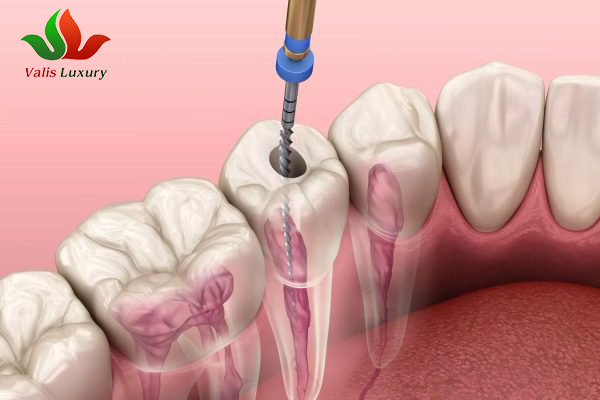What Is Root Canal Treatment and When Do You Need It
Root canal treatment (also known as endodontic therapy) is the process of removing infected, inflamed, or necrotic pulp tissue inside the tooth. After thorough cleaning, the canal is sealed to preserve the tooth structure and prevent future bacterial infection.
The dental pulp contains nerves and blood vessels that nourish the tooth. When the pulp is damaged due to deep decay, trauma, cracked tooth, or prolonged inflammation, it can cause intense pain.

⚠️ Common Signs You May Need a Root Canal:
- Severe toothache, especially at night
- Sensitivity to hot or cold foods
- Tooth discoloration (gray or dark color)
- Swollen, red gums or pus near the tooth root
- Persistent bad breath or unpleasant taste
💭 Is Root Canal Treatment Painful?
The answer is NO, especially when performed at a reputable clinic like Valis Dental, because:
- Local anesthesia is applied beforehand, so you won’t feel pain during the procedure.
- Modern equipment such as apex locators and ultrasonic endodontic tools ensure accuracy and efficiency.
- Experienced dentists perform the procedure gently, minimizing trauma to surrounding tissues.
After the procedure, some mild pain or sensitivity may occur due to tissue response but typically resolves in a few days with proper care and medication.
🔍 Root Canal Procedure at Valis Dental
At Valis Dental, root canal treatment follows a professional and pain-free process, ensuring safety and sterility:
Step 1: Examination & Digital X-ray
The dentist conducts a full exam and takes digital X-rays to assess the inflammation and determine canal shape and length.
Step 2: Local Anesthesia & Access Opening
After cleaning the area, local anesthesia is administered. The dentist then gently creates an opening to access the pulp chamber.
Step 3: Cleaning the Root Canal
Using advanced endodontic instruments, infected pulp and bacteria are removed. The canals are then irrigated with antibacterial solutions.
Step 4: Sealing the Canal
Once clean and properly shaped, the canal is filled and sealed with gutta-percha material to prevent reinfection.
Step 5: Tooth Restoration
Depending on the tooth’s condition, it is restored with either a composite filling or a dental crown to regain function and aesthetics.
🛡️ Does Root Canal Treatment Affect the Tooth?
Root canal therapy is the best way to preserve a natural tooth. However, once the pulp is removed, the tooth no longer receives nourishment and may become brittle over time. To protect it:
- A dental crown is often recommended post-treatment.
- Avoid chewing hard or sticky food on the treated tooth.
- Schedule regular checkups every 6 months.
🙋♂️ Frequently Asked Questions
1. Can I Get a Root Canal During Pregnancy?
Yes, if necessary and properly indicated by a dentist. At Valis Dental, pregnant patients are X-rayed with protective shielding and administered safe anesthesia.
2. Will I Need Medication After a Root Canal?
Your dentist may prescribe painkillers and anti-inflammatory medication. Take them as instructed for a smooth recovery.
3. Can I Eat Normally After the Treatment?
You may eat soft food about 2 hours after treatment. Avoid very hot, cold, or hard foods for the first couple of days.
⭐ Why Choose Valis Dental for Root Canal Treatment?
- Highly skilled dentists with extensive experience in endodontics
- State-of-the-art technology: Apex locator, ultrasonic endodontics, digital X-rays
- Sterile and comfortable clinical environment
- Patient-centered care: Thoughtful consultation, no pressure to treat
- Clear warranty policies for post-treatment restorations
✅ Conclusion
Root canal treatment doesn’t have to be painful when done at a trustworthy dental clinic. Timely intervention helps you relieve severe toothache and save your natural tooth for the long term.
If you’re experiencing tooth sensitivity or suspect pulp inflammation, visit Valis Dental for a professional evaluation. We’re here to deliver a safe, gentle, and effective treatment experience.




